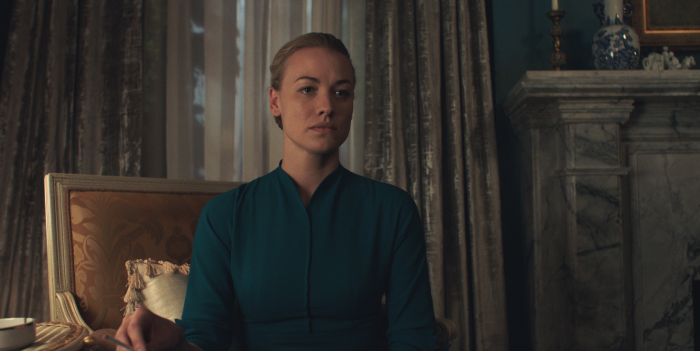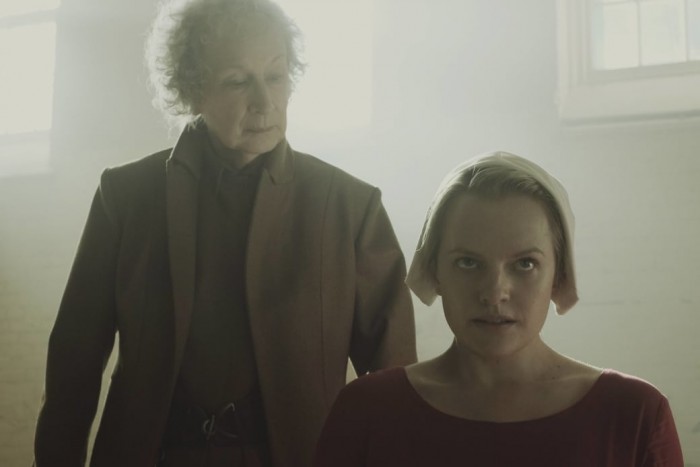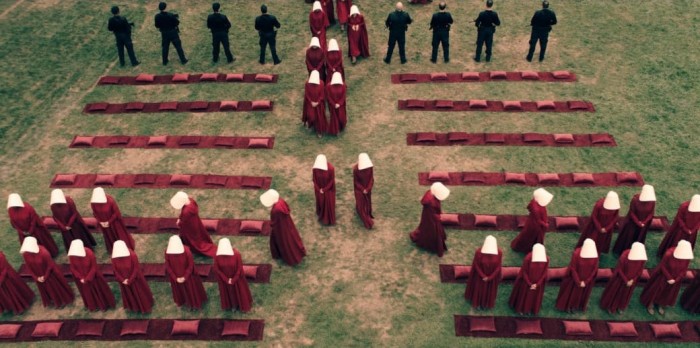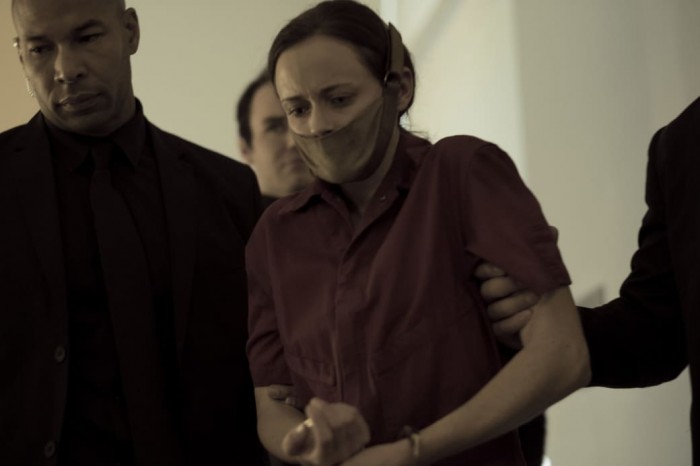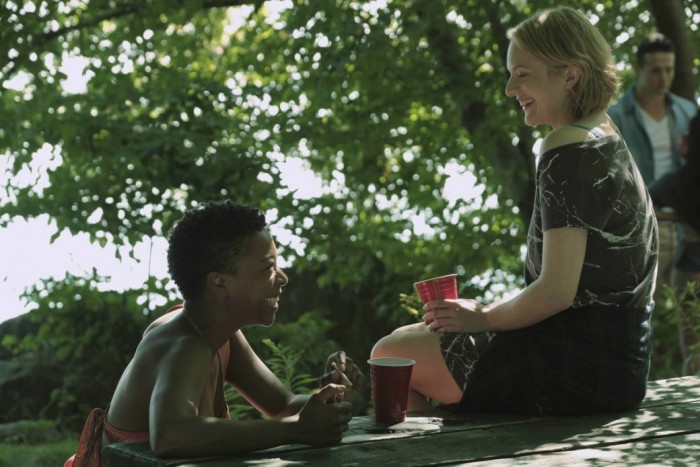'The Handmaid's Tale' And The Unbearable Likeness To Today's Political Climate
The first three episodes of The Handmaid's Tale are harrowing to watch. Not because they contain the systematic rape of women, nor is it the violent realization of misogyny and the patriarchy that is the dystopic Republic of Gilead. It's because the story by Margaret Atwood — originally written in 1985 — is so alarmingly prescient and timely in its reflection of today's political climate.
That's right, we're going political with this article. But The Handmaid's Tale — with its depiction of a totalitarian theocracy that actively represses women and minorities' rights — demands a political reading, especially after that fateful November 8, 2016 Election Day that pushed America one step closer to the terrifying not-too-distant future of The Handmaid's Tale.
Episode 1: "Offred" — The Complicit Women
It seems cruel to begin my Handmaid's Tale recap by pointing out the women who are complicit in the oppressive government when the story is so clearly about feminism. If it's a patriarchal society, shouldn't all women be repressed? Not necessarily.
Gilead was built on complacency and complicity. As Offred intones in the third episode, "I was asleep before, that's how we let it happen. When they slaughtered Congress we didn't wake up. When they blamed terrorists and suspended the Constitution we didn't wake up either. They said it was temporary. Nothing changes instantaneously."
The Handmaid's Tale makes an effort to convince us that the line between the modern-day flashbacks, with its little recognizable quirks — Uber, Tinder, college parties — and the Amish-like present day in Christian fundamentalist Gilead, is thin. The traditional dresses and bonnets that the Handmaids and women wear could fool you into thinking that the series takes place in another time, but it's also not so unbelievable to think that this is the future — especially when the Handmaids pass by a wall from the University of Cambridge, or shop in modern grocery stores. History is cyclical after all, and Atwood's The Handmaid's Tale took its cues from totalitarian regimes in history.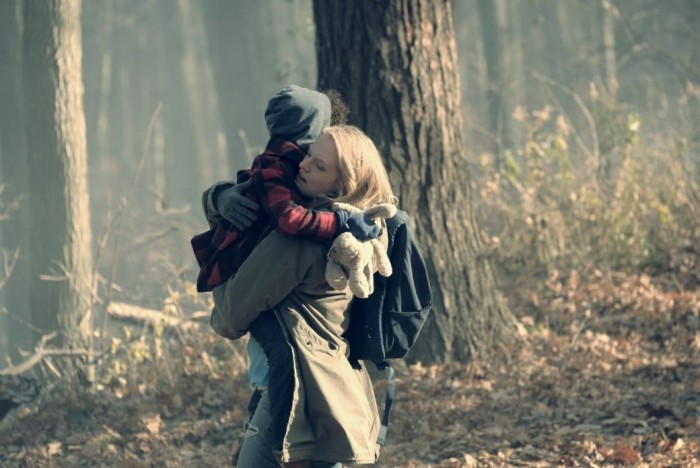
Right off the bat, The Handmaid's Tale grounds us in modern day, opening with Offred (Elizabeth Moss) attempting to flee the country and pursuing soldiers with her daughter (Jordan Blake) and husband Luke (O-T Fagbenle). However, she's caught and brought to the Red Center an institution that re-educates fertile women to become Handmaids, surrogates assigned to well-off families to birth them children in a world where fertility has dropped to near non-existence. But the Center is run by — you guessed it — women, in the form of the abusive Aunts (Ann Dowd is particularly terrifying as the crude Aunt Lydia). The Aunts both value and devalue the women, emphasizing their special role as bearers of the next generation, but berating them as sluts and whores.
Does putting women in the power actually mean that these Aunts are feminists? Far from it. The Handmaid's Tale only makes explicit the social divisions in which we categorize women: Handmaids, surrogates; Marthas, "the help," the Wives, the 1 percent. But even with the Wives, such as Yvonne Strahovski's Serena Joy, wielding power over other women, they're still "less than" their male counterparts.
The casting of Serena Joy as a young, icy blonde is interesting — in the novel she was a former evangelist TV speaker past her prime, cowed by the very system that she helped bring about. Here, she's the picture of a pristine wife, beautiful and willing arm candy for her husband Commander Waterford (Joseph Fiennes), with a few cracks showing beneath the facade. She brings to mind another icy blonde who has launched a thousand think pieces: Ivanka Trump. An abettor to her father Donald Trump's path to the White House, yet a self-proclaimed "feminist," Ivanka Trump has rightly been called out by Saturday Night Live for being "complicit" in Trump's actions and sexual misdeeds. Her appearance and her values soften the blow of the Trump administration's actions — Trump cut Planned Parenthood funding? But Ivanka advocated for a $500 billion childcare plan! There's a rise in anti-Semitic acts under Trump? Ivanka is married to a Jewish man! That dichotomy is present in Serena Joy, who we sympathize with for her pain and for her small kindnesses to Offred — yet she remains quiet and complicit in the face of a government that actively oppresses her.
But what of the victimized Handmaids? To survive and find her daughter again, Offred and the others find themselves having to comply, sometimes in the most brutal and dehumanizing of ways. After one Handmaid-in-training, Janine, lashes out against the Aunts, she's placed in the center of an AA-like meeting of Handmaids (during which Atwood herself makes a cameo as an Aunt!), telling the story of how she was gang raped while the other girls chant "Your fault" and "slut." Later, at the Aunts' urging, an angry mob of Handmaids tears apart an accused rapist, Offred leading the violent charge.
But she's doing it for her daughter, Offred tries to convince herself. But Offred isn't snapped out of her indoctrination into this world until her walking partner Ofglen (Alexis Bledel) reveals she's a fellow rebel and informs Offred that there's an Eye (one of the militarized spies) in her house. At this, Offred awakens from her reverie and reveals to us that her name is June.
Episode 2: "Birth Day" — The Generational Divide and Return to “Tradition”
"A return to traditional values. That's what they fought for," Offred wryly comments in the first episode of The Handmaid's Tale.
The authority figures of Gilead decry the progressive values of the past years — Tinder, birth control, contraception, homosexuality — anything that interrupt the idealized nuclear family. But in following an Old Testament reading of the Bible — the verses of which are sprinkled offhandedly throughout the show — they managed to disrupt that nuclear family even further. The concept of surrogacy is nothing new, but the monthly ritual of impregnating the Handmaid while she lies in the lap of the Wife is — a rite the government derived from a literal reading of a Biblical passage in which Rachel pleads with Jacob to have children by her handmaid Bilhah — is something else.
Like the passage, Gilead takes to Bible with an Old Testament fervor — only it doesn't seem to pay much attention to the religion itself, only using passages to pass laws that suit them.
"A priest, a doctor, a gay man. I think I heard this joke once. This wasn't the punch line," Offred says wearily as she and Ofglen pass a wall whereupon three men have been hung to their death as punishment for their crimes.
Later, a newly befriended Offred and Ofglen pass by that wall, speaking in hurried whispers about their past lives — June as an assistant book editor, and Ofglen as a lesbian student from Missouri living in Cambridge. Ofglen had to hide her sexuality, as being gay is deemed one of the highest crimes, punishable by death. "Gender traitors" they call it, with Gilead banning the word "gay" completely. I don't have to mention what a political lightning rod gay rights have been in our world, which threaten to backslide even after the Supreme Court ruled on gay marriage. The campaign against transgender students using bathrooms of their preference is still raging, with Attorney General Jeff Sessions signaling that transgender rights would no longer be protected under civil rights law. Just last month, a Scottish politician compared gay people to gorillas. It was only six years ago that President Obama repealed "Don't Ask Don't Tell," but its effects and the culture from which it sprang still echoes today — and in The Handmaid's Tale.
Ofglen is not just a secret lesbian, however, she is also a member of the resistance. She pleads with Offred to join them and give them information on her Commander, one of the highest-ranked figures in Gilead. In a stroke of luck, Offred finds herself invited by her Commander for a private, after-dark meeting, in which he asks if she wants to play Scrabble.
This is where the show could have taken another chance for commentary, by casting the Commander and Serena Joy as older and unable to bear children, as they were in the books. It makes sense in terms of today's generational divides, how older generations are responsible for a sliding backwards of progress — they were the ones who voted for Brexit and Trump, promised a return to the lost years before globalization and the dangers of war and refugees. With an older Commander and Serena, it would be a fascinating view of the generation who got what they wanted, and had to reap those consequences. The only positive I can see to a young Commander challenging Offred to Scrabble is that it becomes about the young, beautiful surrogates like Ivanka and Jared Kushner or Paul Ryan, who espouse dangerous ideology that we don't pay attention to because they seem safe.
The "return to tradition" seems most present with the birth of Janine's baby, which all of the Handmaids attend in an orgy of chanting and labor. While the wives conduct their own placebo birthing ritual, the Handmaids surround Janine in a womb-like mass, forgoing doctors and gynecologists in favor of the tent-like conditions of Biblical times.
In contrast, we see a flashback where June is in labor with her child and Luke is driving her to the hospital. As they pass the entrance, a mob of people are in a chant-like prayer outside, sparking visual parallels to both the Handmaid birthing ritual and Planned Parenthood protesters. The illusion of modernity is shattered with small hints like that — and again when June's nurse says "Praise Be" in passing.
Episode 3: "Late" - Christian Fundamentalism Without Christianity
Discovered for her sexuality after she had an affair with a Martha, Ofglen was captured and imprisoned by the Eyes, June later learns, after encountering another woman replacing the Ofglen she knew.
Ofglen gets put on (a very short) trial for her "gender treachery," and the lawyers base trials on Biblical verses, calling the Handmaids and Marthas by numerical IDs in further dehumanization of the women (I don't need to mention what that is in reference to). Ofglen — who learn is Emily — is subjected to "redemption," which in this case, means female genital mutilation — a practice still used in many countries and regimes to subdue women today. Like Atwood said in her New York Times op-ed, The Handmaid's Tale is not based on any particular religion, but rather how totalitarian regimes will use religion to assert their power. As much as The Handmaid's Tale has ties to America's Puritanical roots, it has ties to Islamic or Communist regimes which use religion for similarly oppressive purposes.
At the Red Center, the Handmaid's had drilled into their heads the Bible scripture "Blessed are the meek." But Offred wryly noticed, "They always left out the part about inheriting the Earth."
Much of this episode takes place in flashback, to explain how a fairly modern America turned into the totalitarian Gilead. June and Moira (Samira Wiley) — who I feel sorry for not mentioning her earlier since she appears first in the Red Center and steals the show in each of the flashbacks — see signs of a changing world as they go about their normal days. In "revealing" jogging gear, they get judgmental stares from a woman on the street, at a coffeeshop June's card gets declined and their new (young white male) cashier insults them and calls them "fucking sluts." Moira lashes out at him, but June gets them to leave. Later at June's work, a heavily harmed group of soldiers walk by to escort them out after a new law has been instituted banning women from working or owning property.
June and Moira commiserate over their frozen bank accounts and law and Moira points out, "You know, they needed to do it this way. All the banks accounts and the jobs all at the same time. Can you imagine the airports otherwise?" June brushes it off, but Moira reminds her they've been under martial law since the attack on Congress, and continually refutes June's excuses that it was for their safety. Despite her protestations and her hassling of Luke for his patronizing language against June, she ends up taking him up on his offer to walk her to the station. Like Moira had argued earlier, the regime had made women and everyone dependent on them, so they couldn't even think to escape.
After witnessing the disappearance of Ofglen and the mental unraveling of Janine, Offred defiantly points out the irreligious nature of Gilead to Aunt Lydia, continuing to quote the scripture and getting a cattle prod in the face from the Aunt, who beats her until she's ironically saved by Serena.
However, Serena — who had been endearing herself to Offred after thinking she was pregnant — flips on a dime as soon as Offred confesses she'd gotten her period, throwing her and threatening, "Things can get much worse for you."
The eerie parallels — some obvious, some not — that echo throughout the three-episode premiere of The Handmaid's Tale feel like a wake-up call to us viewers, who until now had been complacent, and perhaps, complicit. But more importantly, it feels like a wake-up call to conservatives, whose recent actions and political obstructionism could put us on the slippery slope leading to something akin to this dystopian future. So in watching The Handmaid's Tale, we have to ask ourselves, is this truly the future that conservatives want?

